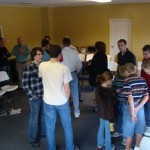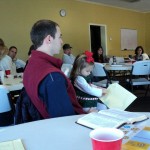They’re doing WHAT on Sunday?
This has to be one of the most encouraging and exciting posts that I’ve read in a long time!
Chris at “The Amplified Life” (I still love that blog name) wrote the post called “Coming Soon: ‘5th Sunday’.”
The post is about some churches (including Chris’ church) who have decided to do something different on Sundays four times per year:
After an encouraging meeting with other church leaders last night we are going to attempt to do something about this. We want our love of God to be made known for all in how we love upon those in our local community. To help others realize that this a part of His church’s “DNA” (cf. Matthew 28:19-20) we are going to begin going outside of our walls together. We are going to serve our community as a local body on the months that have a 5th Sunday. Those days our worship service will actually be service–ministering to the needs of others outside of our own four walls.
What a great idea! Chris said that he got the idea from a friend who lives near Philadelphia.
You might say, “Well, sure, but that’s only four times per year.” Yes, but it’s more than 95+% of churches are doing.
Have you ever heard of churches doing this or something similar? Have you ever been part of something like this?
We want to be with people we care about
Wayne from “The Lifestream Blog” has written an excellent article called “Finding Fellowship.”
In this post, Wayne is answering an email from a reader who is struggling with some “church” issues. The reader asked several questions, but most of them originated in Hebrews 10:25.
Here is part of Wayne’s response:
Believers who love each other will get together. That’s what friends and family do. My kids and grandkids get together every week or two. We don’t do it because we have to, because we’re trying to form a family, or any other reason other than we love each other and enjoy being together. Community is like that too. When we have people we care about we will be together. What so many groups miss is that the relationship must take precedence over the meetings. Meetings are a byproduct, not the method or the goal. If we’ll engage caring relationships first and begin to find a common heart together over dinner and evenings together as friends, we will find time to gather together as that network expands. I think it’s backwards to start a meeting first and hope friendships grow out of that. They can, but rarely do. I’ve been to many home groups where people meet together regularly but it is obvious they don’t really care about each other, spend time with each other beyond the meeting, or are truly friends in Christ.
Think about what Wayne said. I do believe it’s possible (though difficult) for friendships to develop from a meeting. However, I think the meeting must be of a form that encourages friendships and interrelation and not of a form that discourages or hinders relationships.
But, primarily, think about the main message that Wayne is trying to get across: If we care about people, we will want to spend time with them. If we love people and are concerned about them, we will want to meet with them. No one will have to force us or coerce us to meet together.
Pretty straightforward… and very true.
Quick to hear; slow to speak
As I’ve mentioned several times on this blog, I talk too much. I probably write too much here, and I know that I speak too much when I’m with other people.
Don’t misunderstand me; I’m not saying that I should write (here) or talk (when I’m with other people). Instead, I recognize in myself a tendency to speak too much. That is, I tend to speak when I should listen.
Last weekend, God helped me with this problem. With all the weather changes recently (temperatures dropping and rising), my sinuses began to complain. By Sunday morning, when we were meeting with the church, I could barely talk.
So, while the church was reading Scripture about prayer and discussing prayer, I primarily had to shut up and listen. This was a good thing for me, and I hope that I can learn how to listen more even when I can (physically) talk.
I did talk Sunday. But, I had to be very careful and strategic about what I said. While it was a struggle for me to be silent (because of my tendency to talk), I enjoyed listening very much.
Messy Meetings
Four years ago, I wrote a post called “Messy Meetings.” Of all of my posts, this is one of my favorites. I hope you enjoy it.
————————————————————-
Relationships can be messy. We all know this. We have experienced “messy” relationships, and Scripture tells us that relating to people will not be easy. If relationships were easy and maintenance free, then we would not need “Spirit power” in order to love people. If relationships were not messy, then we would not need “Spirit power” in order to bear with one another with patience. In fact, one of the amazing things about our new life in Christ is that we can now – finally – relate to people who we would not naturally be able to relate to. We can now relate to them supernaturally, because we can now relate to God.
Of course, we do not always live in the supernatural. We do not always walk in a worthy manner. We do not always follow the Spirit. We have seen what happens in our lives and in the lives of others when this happens. Things get messy. But, we all know – or at least, we all SHOULD know – that we do not turn our backs on people when their lives get messy.
But, what about during times when the church gathers together? I believe that Scripture teaches that all believers should have the opportunity to interact with one another when the church gathers. This interaction should always be led by the Spirit, motivated by love, and for the purpose of edifying (building up to maturity) other followers of Jesus Christ. I believe God works through the gifts of all in order to grow the entire body of Christ into maturity in Christ Jesus, and I believe that this should happen anytime the church gathers.
But, what happens when one of those “participants” speaks when not led by the Spirit? What happens when someone is not motivated by love, but contributes anyway? What happens when someone acts, but their purpose is not to build up the body? What happens when someone is hurting, and they let the church know about their hurt? What happens when someone is afraid, and they voice their fear? What happens when someone disagrees?
In other words, what happens when things get messy during the meeting of the church?
There are several options in this scenario. The first option – and the one usually taken throughout most of church history, whether people realize it or not – is to limit the amount of participation during the meeting of the church. If only certain people are allowed to speak or sing or pray or contribute, then there is less chance for things to get messy. This is usually done in the name of “order”. However, I think there is an inherent problem with this solution. For one thing, this solution suggests – even inaudibly – that only certain people are qualified to contribute and only certain people are necessary for the proper functioning of the church. Also, this solution suggests – even inaudibly – that the event of the meeting is more important than the people who are meeting. This option also suggests that “messy” relationships between people are equivalent to disorder, and are thus not proper for times when the church gathers.
Another option is to allow the mess to occur, then trust the Spirit of God to use the people of God to lovingly care for the “messy” people – which, can be me or you at times, if we are honest. Thus, even when the church meets, there is a need for “Spirit empowered” love and “Spirit empowered” patience.
What are the implications of this option? Well, first of all, we have to admit that we do not know what will happen when the church gathers together. Things may not go “as planned”. Thus, we have to admit to ourselves and to others that our plan – if we have one – is not the most important thing. Instead, the people become more important than the event. We also must – truly – trust the Holy Spirit to work in and through his people, even during the meeting of the church. We must admit that we do not have all the answer, and that God may not choose to work through us during this meeting (regardless of our title, position, role, function, gifting, etc.). God may choose to work through someone else. He may even choose to work through someone’s mess – if we allow him to.
This is very difficult to do – it is even difficult to think. Even after thinking through this idea of “church” for several years, I still have this habitual understanding that I should be quiet (thus, reverent) when I come together with the church (unless, of course, I have been scheduled to speak). There is also this traditional idea that “order” means “according to plan”.
So, what are we going to do with “messy” people and “messy” meetings? Can we trust God enough to allow him to work through us and others during the meeting, even when things are out of our hands? Can we allow people to hurt, cry, doubt, complain, disagree, etc. while the church meets without rushing them off to a back room or asking them to leave altogether? Can we allow the church to be the church to one another even when the church is meeting?
Monologue and Dialogue – examining Scripture
Two years ago, I wrote a two part series on the use of monologue (one person speaking) and dialogue (multiple people speaking) when the church meets. The first post was called “Monologue and Dialogue – defining the question.” I re-published that post yesterday. This is the second post, called “Monologue and Dialogue – examining Scripture.”
———————————————————————-
Monologue and Dialogue – examining Scripture
In this post, I hope to answer the following question: Do the authors of Scripture command or model either monologue, dialogue, a combination, or something else as a manner of speaking when believers meet together? The context is very important, because I am primarily interested in the meeting of the church.
In my previous post, “Monologue and Dialogue – defining the question“, I offered the following definitions:
Monologue: a long utterance by one person (especially one that prevents others from participating in the conversation)
Dialogue: a reciprocal conversation between two or more entities
(Please see my previous post for a fuller explanation of this discussion.)
Let’s begin by looking at a few passages of Scripture. In 1 Corinthians 14, Paul is speaking specifically about the church meeting. His entire argument centers on what is appropriate when the church comes together. In verse 29, he begins to give some instructions for prophecy:
Let two or three prophets speak, and let the others weigh what is said. If a revelation is made to another sitting there, let the first be silent. (1 Corinthians 14:29-30 ESV)
So, while one person is prophesying (speaking a revelation from God), that person should stop speaking if another person desires to speak. Notice that Paul does not consider whether one person is more mature than another, or whether one person is a better speaker than the other, or whether one person is an elder/pastor while the other is not. In this case, at least, Paul does not limit the number of people speaking to only one person.
Similarly, notice that others weigh what is said by the prophets. So, besides the prophets, there are other people taking part in the meeting of the church.
I do not equate “prophecy” with teaching or preaching. However, in this passage, the instructions for “prophecy” appear to cover any type of speaking that is edifying to the church without interpretation, while the instructions for “tongues” appears to cover any type of speaking that is edifying to the church only with interpretation. Thus, it seems valid to apply these same instructions to teaching, exhortation, and other types of speaking when the church meets.
Second, notice this passage from Acts:
And he entered the synagogue and for three months spoke boldly, reasoning and persuading them about the kingdom of God. But when some became stubborn and continued in unbelief, speaking evil of the Way before the congregation, he withdrew from them and took the disciples with him, reasoning daily in the hall of Tyrannus. (Acts 19:8-9 ESV)
Luke says that Paul “reasoned” with the Jews in the synagogue, and he also “reasoned” with “the disciples” in the hall of Tyrannus. The word translated “reasoned” is also regularly translated “discussed” or “disputed”. For example, the same verb is translated “argued” in the following passage:
But they kept silent, for on the way they had argued with one another about who was the greatest. (Mark 9:34 ESV)
Similarly, this same verb describes what Paul was doing until late at night in Troas:
On the first day of the week, when we were gathered together to break bread, Paul talked [reasoned, discussed] with them, intending to depart on the next day, and he prolonged his speech until midnight. (Acts 20:7 ESV)
This same verb is found later in verse 9. It seems that Paul’s “speech” or “message” may have included more than a monologue from Paul. The verb used at least opens up the possibility that others took part in Paul’s message.
So, at least in Ephesus (Acts 19) and Troas (Acts 20), Paul spoke to believers in such a way as to allow others to have input into what he was saying. This does not necessarily mean that Paul conducted a full-blown discussion, or that there was a question-and-answer session. However, it does seem to indicate that neither Paul, nor Luke, nor the others involved expected only Paul to speak.
Finally, in the book of Hebrews, the author instructs his readers:
And let us consider how to stir up one another to love and good works, not neglecting to meet together, as is the habit of some, but encouraging one another, and all the more as you see the Day drawing near. (Hebrews 10:24-25 ESV)
We shouldn’t miss the fact that the opposite of “neglect to meet together” is “encouraging one another”. There is an implied reciprocal (i.e. “one another”) aspect to our exhortations. In fact, the author had already told his readers to “encourage one another daily” (Hebrews 3:13). Just as all are responsible for “drawing near” (Hebrews 10:21) and “holding fast” (Hebrews 10:22), it would seem that all are responsible for “considering one another” by not neglecting to meet together, but by encouraging one another. Again, more than one person was involved in this “encouraging”.
There are other instances of believers meeting together and more than one person speaking (i.e., Acts 15:6-29, 15:30-33). There is also at least one instance of believers meeting together when only one person spoke (Acts 20:17-38). In this passage, Luke records that Paul “spoke” to the elders from Ephesus, using the standard work for “speak”, not the word discussed above, nor the word for “teach” or “preach”. Thus, in this passage at least, we may have an example of believers meeting together when only one person speaks.
So, there certainly may have been instances where only one person spoke during the meeting of the church. But, Scripture does not give us many of these examples. Instead, we primarily have examples of several people either speaking or having the option to speak when the church meets. Similarly, when teaching specifically about the church meeting, we are not instructed that only one person should speak, but that all should have that option. It seems that in general, even when one person primarily spoke during a meeting, and even when that person was an apostle like Paul, there was the possibility and probability that others would take part.
Thus, I would lean toward Scripture instructing us to use a combination of both monologue and dialogue when the church meets, with dialogue being default or primary.
Monologue and Dialogue – defining the question
Two years ago, I wrote a two part series on the use of monologue (one person speaking) and dialogue (multiple people speaking) when the church meets. The first post was called “Monologue and Dialogue – defining the question.” I will post the second part of this series tomorrow.
———————————————————————
Monologue and Dialogue – defining the question
Last week, in my post “On the Sermon“, I linked to a post called “How We Do Church: To Preach or Not to Preach?” in which the author (Michael) suggested that monologue was less effective than discussion in helping people toward maturity. I said very little in the post itself, and simple asked this question:
So, what do you think? Which is more effective in helping people grow toward maturity in Christ: monologue, dialogue, a combination, something else?
I was very specific in the way that I asked my question. I did not ask about the effectiveness of preaching as opposed to teaching. But, during the discussion, while some suggested that both monologue and dialogue were good and necessary in some contexts, it seems that most wanted to argue for either “preaching” or “discussion”.
I think this is a false dichotomy, primarily because Scripture does not define “preaching” or “teaching” for us in those terms. Thus, we can proclaim the good news of Jesus Christ (“preach”) with either monologue or dialogue. We can teach people how to live a life “worthy of the gospel” with either monologue or dialogue. Thus, preferring dialogue is not the same thing as denying the necessity or effectiveness of either preaching or teaching.
Instead, I think it would be beneficial to consider the effectiveness of either monologue or dialogue. More importantly – and the purpose of this two-part series – I think it is important to determine if either monologue or dialogue is commanded or modeled by the New Testament. In particular, my concern is the context of the church meeting. When the church meets together, do the New Testament authors either command or model monologue, dialogue, a combination, or something else?
Let’s start with a couple of definitions so that we are all talking about the same thing. These are the definitions that I will use in these two posts (I’ve included links to the sources of the definitions):
Monologue: a long utterance by one person (especially one that prevents others from participating in the conversation)
Dialogue: a reciprocal conversation between two or more entities
The distinction between the two terms is very important. In a monologue, only one person speaks, while all others listen to what is said. Other are not allowed to speak (by either explicit or implicit agreement). In a dialogue, more than one person speaks or has the freedom to speak. Others are allowed to speak (again by either explicit or implicit agreement), even if one person speaks for most of the time, or even if others choose not to speak.
It is not my desire to question the monologue sermon simply because I want to question traditional practices. I am not opposed to traditional practices if they are scriptural. I am opposed to traditional practices if they are contrary to Scripture or if they hinder the church from growing toward maturity as described in Scripture. I am also opposed to innovative practices if they are contrary to Scripture or if they hinder the church from growing toward maturity as described in Scripture.
Thus, my primary goal in examining the way believers should speak during the church meeting (as well as other practices that occur during the church meeting) is to see the church – all believers – grow in maturity toward Christ-likeness.
My purpose in the next post is to consider passages from Scripture in which one or more than one person speaks while the believers are meeting together in order to determine if monologue, dialogue, a combination, or something else is either commanded or modelled.
Starting together
Earlier this week, I mentioned that Sol from “Looking for Church” wanted to begin getting together with other brothers and sisters in his home during the week.
He asked for help. And several people made suggestions… some very good suggestions. Sol made each comment advice into a new post.
I thought it would be beneficial for my readers to see all of this good advice. So, here are his posts, beginning with the posts where he talks about beginning to meet together:
- Starting with a Meeting
- We Want To Get Together
- Family… Not “Church”
- A Family… With A Purpose
- Don’t Over Think It
I think there is some very good advice in those comments/posts… the kind of advice that can help any group of believers. What do you think?
Share your experience and advice
Sol at “Looking for Church” has written a post called “Starting With A Meeting.”
In this post, Sol explains that he is planning to begin meeting with other brothers and sisters in Christ at his house during the week. While he says that he wants “more than a meeting,” he understands that whatever happens will probably begin with a meeting.
Sol writes:
As I mentioned yesterday, several of us here are going to start getting together at my house during the week. I’ve been searching the web, and poking around on some blogs for advice…
I’m hoping for more advice on this too.
I’m sure others have experiences and advice to share, so please comment if you can. I would love to hear it… and I need it.
I left him my 2 cents worth in a comment here, which he’s copied in his post. Can you give him some advice also? Perhaps you can share your experience?
Jump over to Sol’s post and help him out.
Who should teach?
In his latest post, Eric from “A Pilgrim’s Progress” presents another article in his series on house church: “House Church – Teaching.”
(By the way, it should be mentioned that Eric is presenting a particular form of meeting as a “house church.” All house churches do not follow what Eric is describing.)
In his post, Eric presents scriptural evidence that elders should teach, those gifted as teachers should teach, and others should teach as well.
I like the way that he concludes best of all. Eric points out that while teaching with words is important, teaching through actions is usually more effective:
Teaching, then, ought to be more than just verbal instruction. Â Teaching is most effective when it is experienced. Â Therefore, in the life of the church we best teach and are taught through both hearing and doing. To follow the model set forth by our Lord, we teach and learn through service to others.
In fact, I would say that teaching with words becomes effective only when it is combined with teaching through actions.
What do you think?
Gathering suggests dispersal
Three years ago, I wrote a post called “Gathering suggests dispersal.” In this post (as well as a few others that I’ve written through the years) I’m connecting gathering with other believers to our mandate to go out into the world. We need to gather together, but gathering is not our mission. Our mission is “out there.”
———————————————————————–
As most of us – and most followers of Christ – know, the word translated “church” in our English New Testaments is the Greek noun εκκλησία (ekklÄ“sia). Some continue to make a big deal of the etymology of the word and suggest that εκκλησία (ekklÄ“sia) means “called out ones”. In fact, the word simply refers to an assembly or a gathering.
When used to refer to the εκκλησία (ekklÄ“sia) of God, it would thus mean the assembled or gathered people of God. The discussion continues as to whether this is a fixed, continuous assembly or an assembly that may be in flux. Regardless, the phrase points to a group of God’s people as they are gathered together.
As you probably know if you read my blog regularly, I am very interested in the meeting of the church – that is, the who, what, when, where, why, and how of the people of God when they assemble. Primarily, I am studying the purpose for the meeting of the church. I believe that purpose is edification or building up the people of God toward maturity in Christ.
However, as I was thinking about εκκλησία (ekklÄ“sia) a few days ago, I realized that a gathering or an assembly, by its nature, suggests a dispersal. The people of God gather because, in general, they are not assembled – they are dispersed. Whether we meet weekly, bi-weekly, semi-weekly, or even daily, we still spend most of our time dispersed – separated from one another.
This is where we find our mission – while we are dispersed. Our mission – task, if you will – is not to assemble, but to be ambassadors of God to those who are not part of his family. If we find our time consumed with gathering – assembling – meeting – then we have missed our most important duty of being salt and light to the world – of taking the gospel to those outside the church – of speaking God’s grace and truth into lives who are far from God.
Gathering is important. It is very important. But, it is not everything. In fact, gathering suggests dispersal. God gathers us together with his family by his Spirit, because we are not normally gathered; we are normally dispersed. But, if we find ourselves spending all of our time and effort and resources gathering, then I think we are missing something important – very important.
Yes, gather together with brothers and sisters in Christ. Build up one another using the gifts that God provides, and thereby bring glory to God. But, also, don’t forget to disperse in order to take the gospel to your family, friends, neighbors, co-workers, even strangers that God brings into your life.








